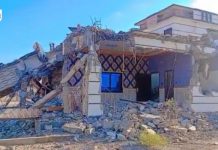Author: Mehr Shanz Khan Baloch
War, in general, and the struggle for freedom, in particular, are fought with diverse strategies on various fronts. The chains of slavery are not broken solely by the thunder of guns on the battlefield or by the solitary writer’s thoughts penned into words in a room. It requires a comprehensive approach where mothers educate their sons to be familiar with both intellectual and physical forms of resistance, the Kalashnikov and the book.
Do such mothers gain this awareness only after enduring immense suffering? Or is the love of their homeland, nurtured by Baloch traditions, enough to inspire them to guide their children towards the path of Baloch leadership, martyrdom, and immortality? They teach their children to embrace death on the battlefield, to kiss the bullet like a lover’s lips, and to live on in the hearts of their people.
These are the offspring of a thought that urges them to call their enemy an enemy, to stand up for their rights, and to sacrifice their lives, like moths drawn to a flame. Certainly, the passion for their homeland and the joy of life can transform an ordinary person into a mountain prince. In the valleys of countless mountains of pain and in the deserts of blood, they seek the oasis of resistance. They consider the beautiful valleys of Bolan and Chiltan as fortresses, and ride their horses of struggle to become martyrs, joining the ranks of heroes. Even the wind of their homeland yearns to kiss these immortal souls.
Beyond emotions and anger, these sons of their homeland possess the courage to confront danger with unwavering determination. They view every act of defiance against oppression on their homeland’s soil as a link in the chain of revolutionary struggle. If a shepherd, instead of leading his flock towards a military checkpoint, chooses a longer route to avoid giving his milk or other products to the soldiers and instead offers them to a struggling freedom fighter, this too is a revolutionary act. It reflects a desire to alleviate suffering and promote peace, even at personal cost.
If a common student, fearing arrest or intimidation, hides their identity and expresses their love for their homeland through their words, they too are part of this inspiring thought. They are like thunderbolts that strike down their enemies on their own land. A Baloch mother who wants to educate her children so that they can serve their homeland and, if necessary, tell stories of oppression to future generations is also participating in this revolutionary tradition. She is passing the torch of struggle to her younger generations.
Robert Pape, who studied over 300 suicide cases from 1985 to 2005, concluded that religion plays a minimal role in such incidents. Most suicide attacks are motivated by a desire to preserve their homeland’s identity and character. Mahal, a well-educated girl from a political family, was deeply aware of the philosophy of life, the theory of revolution, the revolutionary movement, and the challenges faced by those living under the yoke of slavery. She was determined to achieve immortality. Her final decision reflects her level of consciousness. She was inspired not only by Maxim Gorky but also by Franz Fanon, Kafka, Jean-Paul Sartre, and other philosophers. She renounced the comforts of life and dedicated herself to the liberation of her country. She imagined freeing the oppressed, the marginalized, and the exploited Baloch common people. With a smile, she addressed the Punjabis and Chinese, saying that this caravan, driven by the philosophy of Aslam, Shari, and Sumayya (known as Sammul), is unbreakable and unwavering.
Aslam, who sacrificed his elder son and himself for the sake of his land’s freedom, Shari, a conscious and knowledgeable person who sacrificed her comfortable life for freedom and crushed the curse of slavery through her persistent struggle, and Sammul, who tied a jacket filled with explosives to her body to destroy the oppressors in the enchanting land of Kech, became one with the winds of Makran.
Mahal knew that when she drove her car, loaded with over half a ton of explosives, towards the enemy’s fortified walls and checkpoints, she would attain eternal life, merging with the winds of her beloved homeland. However, she would also leave behind a legacy of terror and chaos that would shake the enemy to their core. The world would remember this event as “Operation Herof” and Baloch poets and bards would immortalize it in their songs. Mothers would sing lullabies to their children, telling them the stories of Mahal, Fazal Gul, Ghaus Bakhsh, Muhammad Bakhsh, Asif Nichari, Rizwan, Mohand, Tayyib, and Junaid Zehri. They would tell the stories of Herof and inspire them with the spirit of Baloch traditions and patriotism.
From 1630 to 1947, 75% of freedom movements and rebellions failed, primarily due to a lack of technology and modern weapons, making guerrilla warfare nearly impossible. However, the invention of the Kalashnikov in 1947 led to the success of 75-85% of subsequent freedom struggles. The Kalashnikov’s ability to strike enemies from a safe distance and inflict heavy casualties without being detected is crucial in such conflicts. The enemy, losing control, often resorts to harming the civilian population. They adopt policies of “kill and dump,” “abduct and disappear,” and arm the wretched and treacherous outlaws against the strong and honorable citizens. When a state resorts to such measures, it is clear that it is losing its grip and struggling to maintain its hold.
Changing tactics, secrecy, and unpredictable attacks can frustrate the enemy and alienate them from their own people. The Chinese Shaolin are known not only for their martial arts but also for their timing. Their ability to strike at the right moment is what makes them formidable. Freedom movements are not just about the sound of the Kalashnikov or the cries of despair. They are about the combined power of the gun and the pen, the sound of the Kalashnikov and the written word, the visual and the auditory.
Disclaimer: The views and opinions expressed in this article are those of the author and do not necessarily reflect the official policy or position of The Balochistan Post or any of its editors.






























